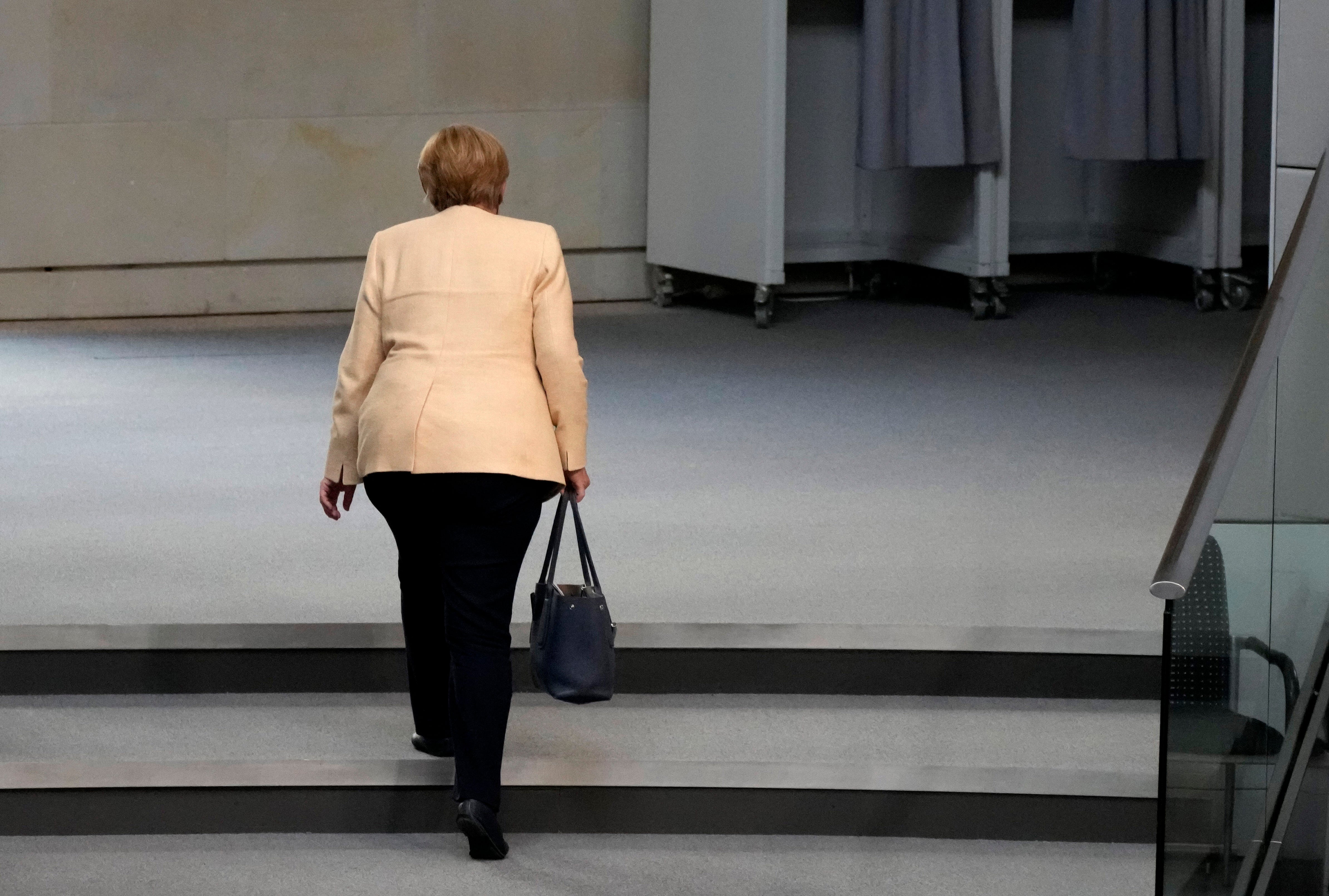‘I could also see her going more to the opera’ – what next for Angela Merkel?
Merkel this week concluded her attendance at her final Cop summit as Germany’s leader, marking more than a quarter-century as an international figure, writes Borzou Daragahi


More than 26 years ago, at what was the world’s first Cop summit on climate change in Berlin, diplomats and others were impressed by a rising star in German politics who was then serving as the country’s environment minister.
The minister, who was elected to preside over the summit, seemed to understand the significance of the meeting. In her opening speech, she described climate protection as one of the world’s greatest political challenges, noted that industrialised nations’ obligations were inadequate and said major shifts must be put into place.
Angela Merkel, then a 40-year-old quantum physicist-turned-politician, quietly built alliances, hammered out details along the sidelines of the summit and won over sceptics to get a climate deal signed. It would later be hailed as the future German chancellor’s first successful foray into international diplomacy. And it would not be her last.
Merkel this week concluded her attendance at her final Cop summit as Germany’s leader, marking more than a quarter-century as an international figure with a negotiating style that has made her a standout.
“Her being a scientist led to her being named environment minister, and it’s interesting to see that Angela Merkel’s first contribution was to negotiate a climate deal,” says Matt Qvortrup, professor of political science and international relations at Coventry University and author of Angela Merkel: Europe’s Most Influential Leader. “She had a particular method. She became famous for negotiating summits.”
Merkel’s low-key leadership style has been the subject of numerous studies. A Harvard law school briefing last month underscored her upbringing in Communist-ruled East Germany, where she often had to weigh her words cautiously and think about their impact like a chess player, “a few moves ahead of her competitor,” said Rainer Eppelmann, a dissident East German clergyman, in a 2014 interview with The New Yorker.
Among the other lessons drawn from Merkel’s negotiating style is her ability to take an outsider’s view of her actions to see them more rationally; her listening to counterparts without interrupting, and then asking questions for clarification, and focusing on reason over gut instinct. “Impulsivity can be dangerous in negotiation,” said the Harvard law school briefing.
Prof Qvortrup describes Merkel’s style as “government by spreadsheet rather than government by tweet,” which explains the friction between Germany and the US under then-president Donald Trump, who was all instinct. “It’s about getting meticulous and factual,” says Prof Qvortrup. “It’s about solving the problem rather than winning the debate. It’s getting the politics and anger out of the debate.”
When confronted with a bellicose figure like Trump or Italy’s former prime minister Silvio Berlusconi, Merkel would turn the debate toward solving whatever differences they may have rather than attempt to score points back home. Adversaries would launch attacks that played with the mob. Merkel never took the bait. “OK”, she would say. “How do we fix this?”
Betto van Waarden, historian of media and politics at Lund University, recently described Merkel as “the quintessential anti-celebrity” politician, contrasting her with Trump, Brazilian footballer-turned-senator Romario de Souza Faria or Ukrainian comedian-turned-president Volodymyr Zelensky. “Merkel’s politics appeared non-staged and she was known for her apparent sincerity, neutral appearance, avoidance of media show and controversy, and lack of emotion and impulsiveness,” he wrote.
Still, there are drawbacks to her style. It’s possible she lacks a willingness to contemplate the raw political motives and ambition that led her to be blindsided by developments such as the rise of Trump and Brexit.
“You have low unemployment, a booming economy, you’re growing faster than most of Europe,” she said in 2014 to the UK’s then-prime minister David Cameron, who was seeking to curtail freedom of movement to Britain amid Brexit demands within his party. “And you are pulling in highly qualified labour, cheaply. Explain to me what the problem is.”
To keep up to speed with all the latest opinions and comment sign up to our free weekly Voices newsletter by clicking here
Certainly, Merkel’s style can be seen as playing to her own public. She benefits from a broad middle-brow, educated German middle class that shuns demagoguery and prefers substance over slogans.
And polls have consistently shown her brand of no-sense political leadership is viewed favourably across the world. A September study by Pew Research showed majorities in nearly every nation surveyed had confidence in Merkel to do the right thing in global affairs. She handily walloped Russian president Vladimir Putin and Chinese president Xi Jinping, while beating out both French president Emmanuel Macron and US president Joe Biden. “In most places surveyed, trust in the German chancellor has never been higher,” the study concluded.
Now that she’s retiring from the chancellorship, can we expect to see Merkel bring her negotiating skills to solve global problems such as climate change or the crises in the Middle East? Prof Qvortrup doubts it. From Willy Brandt to Helmut Kohl or Gerhard Schroder, German chancellors tend to fade away from the limelight after leaving office.
“She’s going to enjoy her retirement,” Prof Qvortrup says. “If it’s a small, pragmatic thing at the UN, she could probably do it. But I could also see her going more to the opera.”






Join our commenting forum
Join thought-provoking conversations, follow other Independent readers and see their replies
0Comments